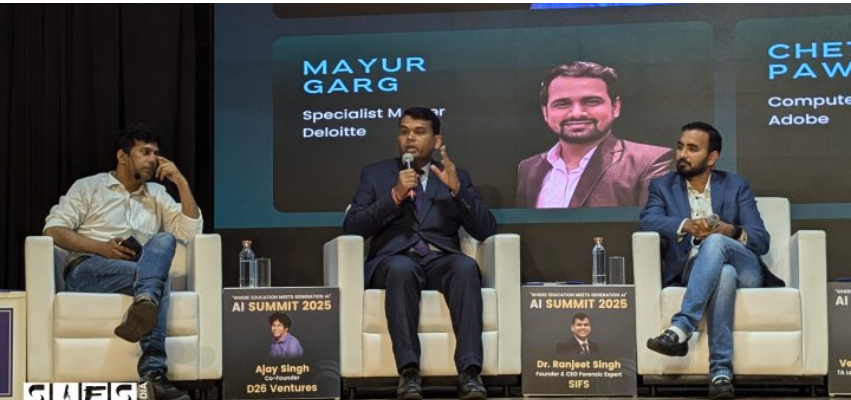A few moments in life truly stay with you, not because of the applause or recognition, but because of the exchange of ideas that inspire and shape the future.
For me, one such moment unfolded at the AI Summit 2025, hosted by KIET Group of Institutions on 16 May 2025.
It was an absolute honor to share the stage with some of the brightest minds from the HR and AI domains, where we came together for a panel discussion on “From Prompts to Productivity.”
As I sat among thought leaders, innovators, and changemakers, I realized how far the conversation around Artificial Intelligence has come.
AI is no longer just a futuristic buzzword; it’s actively transforming the way we work, hire, and innovate.
And being part of this dialogue felt like standing at the crossroads of the present and the future.
The Theme: From Prompts to Productivity
The panel’s theme was simple yet profound: how do we move beyond seeing AI as a tool for clever prompts and instead leverage it to boost productivity in meaningful ways?
This resonated with me because, over the past few years, I have witnessed organizations shift from experimenting with AI chatbots and automation tools to embedding AI into their core strategies.
For HR professionals, this shift is particularly significant.
Recruitment processes that once consumed weeks can now be streamlined through AI-powered screening tools.
Employee engagement surveys are no longer just about feedback forms; they are analyzed through natural language processing to identify deeper insights into workforce sentiment.
And in the learning and development space, personalized training modules created with AI are making upskilling more effective than ever before.
During the discussion, I shared how AI is not here to replace human potential but to amplify it. The human brain thrives on creativity, empathy, and intuition, qualities machines cannot replicate.
But when paired with AI, we unlock a powerful synergy where humans focus on innovation while AI manages repetitive, time-intensive tasks.
The Human Side of AI in Workplaces
One of the most engaging parts of our conversation revolved around the human aspect of AI integration.
I emphasized that while AI can bring remarkable efficiency, organizations must not lose sight of the people driving the change.
A workplace that runs on algorithms but neglects emotional intelligence will struggle to create true innovation.
For example, imagine an HR team relying entirely on AI to shortlist candidates. While the system may identify the best match based on skills and qualifications, it cannot gauge subtle factors like cultural fit, resilience, or passion. That’s where human judgment remains irreplaceable.
We also explored the growing need for reskilling and adaptability.
AI-driven shifts in industries are creating new roles while making some traditional ones redundant.
This means individuals and organizations must be prepared for continuous learning.
I believe this is where academia and industry partnerships will play a crucial role, preparing students not just for the jobs of today but for the evolving challenges of tomorrow.
My Key Takeaway: Collaboration Over Competition
If there is one message I carried back from the summit, it’s that AI is not about humans versus machines; it’s about humans with machines.
The competitive narrative of “AI taking over jobs” is slowly giving way to a more collaborative outlook.
Take the example of AI in healthcare.
Doctors now use AI-assisted diagnostic tools to detect diseases with higher accuracy.
Yet, it is the compassion and decision-making ability of the doctor that ensures patients feel seen and cared for. Similarly, in HR and corporate environments, AI may handle data, but leaders must handle people.
Looking Ahead
Standing on that stage, engaging in thought-provoking conversations with fellow experts, I felt a deep sense of gratitude.
Events like these remind me why I chose this path in the first place: to learn, to contribute, and to be part of shaping a future where technology and humanity move forward together.
I am thankful to the KIET Group of Institutions for creating this platform.
The energy in the room was electric. The students, faculty, and participants were curious, open-minded, and eager to explore how AI is rewriting the rules of work and productivity.
Their questions pushed us to think deeper, and their enthusiasm assured me that the next generation is ready to carry the baton of innovation.
The summit was not just about celebrating AI’s potential but also about acknowledging the responsibility that comes with it.
As we continue to integrate AI into workplaces, we must ensure that it promotes inclusivity, fairness, and ethical practices.
Technology is only as good as the intent behind its use.
For me, the journey ahead is clear: to keep exploring how AI can enhance our professional and personal lives while keeping humanity at the center.
The conversations at the AI Summit 2025 were just the beginning, and I look forward to contributing to many more dialogues that bridge the gap between technology and people.
Final Thoughts
When I look back at the summit, what stays with me is not just the theme of “From Prompts to Productivity,” but the realization that productivity in the age of AI is not about doing more—it’s about doing better.
And as long as we nurture the balance between human creativity and machine intelligence, the future of work looks not just efficient, but truly inspiring.


